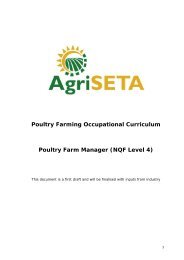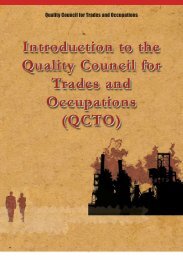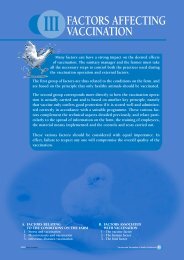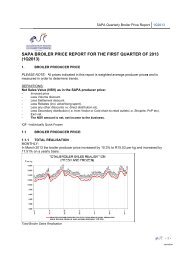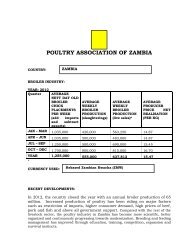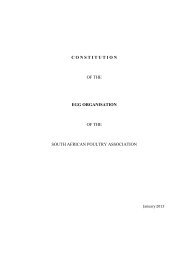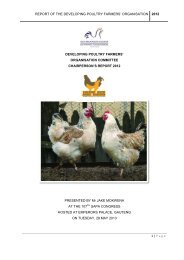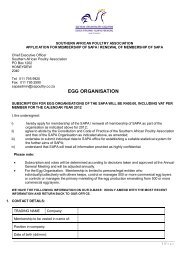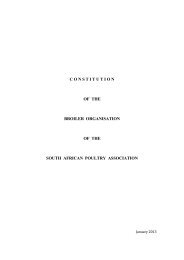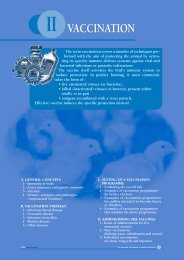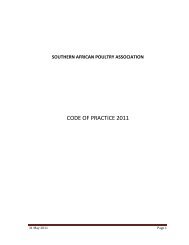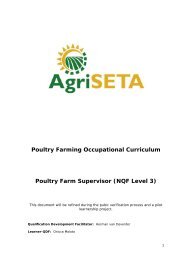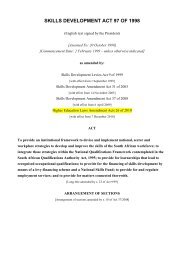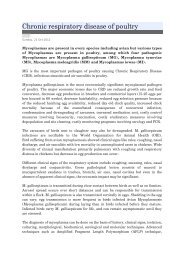industry news - SAPA
industry news - SAPA
industry news - SAPA
Create successful ePaper yourself
Turn your PDF publications into a flip-book with our unique Google optimized e-Paper software.
TRAINING<br />
“you will never get a job because you will be overqualified”; or<br />
decide they can live on meagre scholarship funding for another<br />
4 years, they can pursue a Doctorate. This is also assuming they<br />
don't receive a brilliant job offer and are up to a lot of very<br />
challenging work. Sometimes the views some people have<br />
about PhD graduates reminds me of the ancient Romans –<br />
whose bogey-men were the Gauls. Well, for many, a PhD<br />
graduate is that – a Gaul. I think these misconceptions are due<br />
to the fact that there are so few PhD graduates, especially in our<br />
<strong>industry</strong>. And because of that, people do not really know what to<br />
expect (or what to do) with someone holding this kind of<br />
qualification.<br />
“Beyond having large knowledge about a very<br />
specific research problem and all the “hard” scientific<br />
skills which they gather during the duration of their<br />
degree, what comes with the process is that intellectual<br />
independence and maturity”<br />
On the other hand, the government and the Department of<br />
Higher Education and Training are placing tremendous pressure<br />
on Higher Education institutions to recruit and graduate more<br />
Doctorates. The reason for doing this is because research and<br />
development are essential to the country's future growth. For<br />
South Africa to become a knowledge economy, it is essential<br />
that we have PhD graduates in all fields (and our <strong>industry</strong> is not<br />
an exception). This will allow the country to compete with<br />
developed countries and to become independent in terms of<br />
knowledge generation – to stop relying on others to create<br />
knowledge. Local solutions to local problems may give us an<br />
added advantage as companies compete in a global market.<br />
A PhD programme is intensive and requires a large degree of<br />
self-reliance, self-motivation and passion. During this time, the<br />
38 | MARCH 2011 PLUIMVEE POULTRY BULLETIN<br />
student will become intimately involved with the topic of his or<br />
her research. But beyond having large knowledge about a very<br />
specific research problem and all the “hard” scientific skills which<br />
they gather during the duration of their degree, what comes with<br />
the process is that intellectual independence and maturity. PhD<br />
graduates very quickly can adapt and fit into a working position<br />
which is not directly related with their subject of research. It is<br />
because of the skills developed during the degree that these<br />
people can evaluate and resolve problems from very different<br />
angles. They are independent thinkers and, in most cases, very<br />
innovative and capable of creating new ways of doing business.<br />
Recruiting a PhD just out of University, without any work<br />
experience, may also require some sort of short-term<br />
preparation or mentoring. But these are highly adaptable people<br />
who are sure to hit the floor running.<br />
With the critical shortage of skilled people in our <strong>industry</strong>, it has<br />
been increasingly more difficult to recruit PhD candidates. If we<br />
consider that only a small proportion of matriculants can actually<br />
access University, and from these, an even smaller proportion<br />
continue with postgraduate degrees, our <strong>industry</strong> is at risk of<br />
falling behind in terms of knowledge independence. It is true that<br />
we are highly integrated and interlinked with foreign companies<br />
and that most of the technology and developments are imported<br />
through these liaisons. However, we also know that on the<br />
ground, people want to see locally-generated knowledge. We<br />
are grateful for the support that the <strong>industry</strong> gives us, to be able<br />
to assist us in producing the much needed skilled people to<br />
enter the working world. Our commitment is to strive for<br />
excellence in training and in the creation of knowledge in South<br />
Africa.<br />
The above article is a collaborative contribution by Dr Mariana<br />
Ciacciariello and Dr Nicky Tyler, who are part of the Poultry<br />
Team at UKZN, together with Emeritus Professor Rob Gous. Dr<br />
Ciacciariello focuses in poultry nutrition and management with<br />
special interest in broiler breeder hens; while Dr Tyler focuses in<br />
poultry reproduction, with special interest in male management<br />
and performance.



